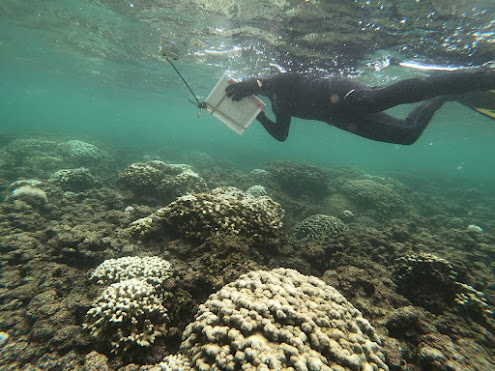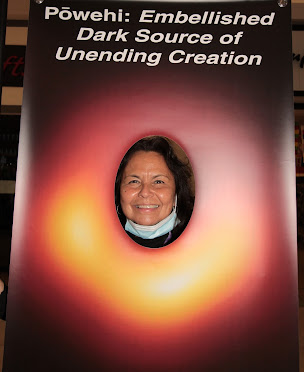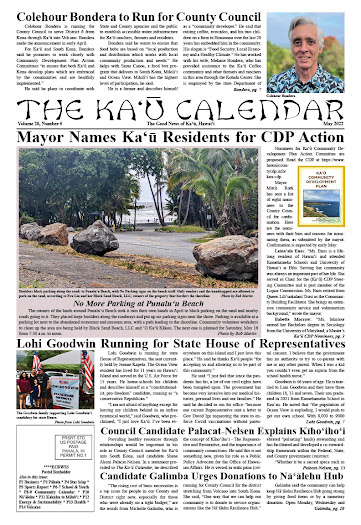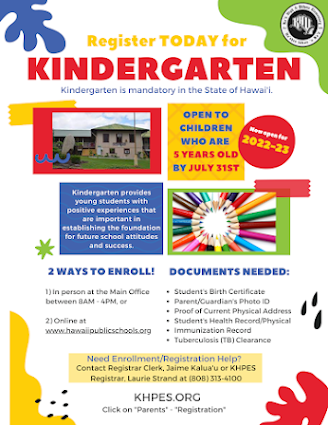A NEW PUNALU'U TURTLE & BEACH MONITORING GROUP at Black Sand Beach has drawn volunteers daily to the shoreline to watch over turtles and advise beachgoers to stay away from them. Punalu'u mauka resident Guy Enriques, whose family has run lei stands at the beach for generations and also served as volunteer lifeguards over the years, helped to organize the group.
 |
| Guy Enriques years ago with baby hawksbill turtles scurrying to the ocean as onlookers lined the path to the shore. Photo by Julia Neal |
 |
| Punalu'u residents Chris and Kathleen Mummie take a shift with the Malama Pono Punalu'u group. Photo from Malama Pono Punalu'u |
"What we are looking for," said Enriques, "are people who have the time, are interested in the turtles and want to help the community." Those who want to volunteer can call Enriques at 808-217-2253 or email enriques@hawaii.rr.com.
To read comments, add your own, and like this story, see www.facebook.com/kaucalendar/. See latest print edition at. www.kaucalendar.com. See upcoming events at https://kaunewsbriefs.blogspot.com/2022/04/upcoming-events-for-kau-and-volcano.html
TO PROTECT CORAL REEFS BY PROHIBITING SALE AND DISTRIBUTION OF SUNSCREEN containing such chemicals as oxybenzone, the County Council will consider a bill on May 17. Hawai'i Wildlife Fund favors the legislation. Its president Megan Lamson and Executive Director Hannah Bernard wrote to members of the council Committee on Climate Resilience & Natural Resource Management. The letter notes the the bill would ban "sale or distribution of non-mineral sunscreen, unless prescribed by a
licensed healthcare provider." It would take effect Dec 1.
State of Hawai'i already became the first place in the world to ban such sunscreens but the law is not enforced. CVS and some other retailers have taken the sunscreen with damaging chemicals off their shelves. Hawai'i Wildlife Fund is vying for more legislation, this time at the county level to further encourage reduction of sunscreen going into the ocean.
"We are in full support of this initiative that would effectively reduce the amount of chemical stressors on our coral reefs!" declares Hawai'i Wildlife Fund. "Research has already shown that certain chemicals
 |
| A bill before the County Council would ban non-mineral sunscreens, which contain chemicals that bleach and damage coral reefs. Photo from state Department of Land & Natural Resources |
"Coral reef ecosystems are intimately connected to the health and welfare of our island communities. Our reefs not only support life in Hawai‘i but equate to $360 million directly to the state's economy each year (directly and indirectly).
"In light of the devastating declines in coral cover across West Hawai‘i in 2015, now more than ever, we need to commit to conservation efforts such as this one and pass Bill 167 into law. Put simply, there are better (more eco-friendly) ways to protect residents and visitors from UV rays that do not put the health of our reefs at risk."
Hawai‘i Wildlife Fund has been working to conserve native species in Hawai‘i since 1996, and is well known for beach cleanups and anchialine pond work in Kaʻū, as well as educational outreach in the schools. The letter notes that the organization is "involved in research, education, restoration and advocacy projects related to the protection of coastal and nearshore ecosystems around the Pae ‘Āina. Mahalo for voting to pass this bill. Me ke aloha pumehana."
To read comments, add your own, and like this story, see www.facebook.com/kaucalendar/. See latest print edition at. www.kaucalendar.com. See upcoming events at https://kaunewsbriefs.blogspot.com/2022/04/upcoming-events-for-kau-and-volcano.html
 |
| Debra Cabral-Galapir, of Pāhala, inside Pōwehi on Astro Day held Saturday at Prince Kuhio Plaza in Hilo. Photo by Tim Wright AFT |
ASTRODAY took flight on Saturday with educational displays on astronomy at Prince Kuhio Plaza in Hilo. The event drew folks from Kaʻū, including Debra Cabral-Galapir, of Pāhala, who found herself in a display about the first-ever photographed black hole, Pōwehi.
AstroDay is sponsored by University of Hawai'i Institute for Astronomy and Maunakea Astronomy Outreach Committee. The annual event was dark for two years due to covid. AstroDay is celebrated on the same day as the international Astronomy Day.


.jpg)
